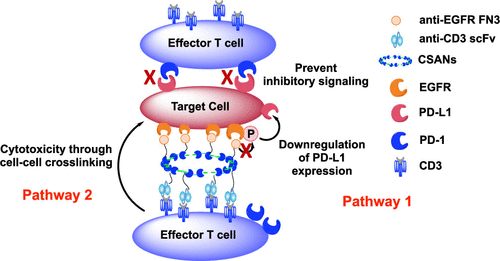当前位置:
X-MOL 学术
›
J. Med. Chem.
›
论文详情
Our official English website, www.x-mol.net, welcomes your feedback! (Note: you will need to create a separate account there.)
Anti-EGFR Fibronectin Bispecific Chemically Self-Assembling Nanorings (CSANs) Induce Potent T Cell-Mediated Antitumor Responses and Downregulation of EGFR Signaling and PD-1/PD-L1 Expression.
Journal of Medicinal Chemistry ( IF 7.3 ) Pub Date : 2020-08-27 , DOI: 10.1021/acs.jmedchem.0c00489 Ozgun Kilic , Marcos R Matos de Souza 1 , Abdulaziz A Almotlak , Yiao Wang , Jill M Siegfried , Mark D Distefano , Carston R Wagner
Journal of Medicinal Chemistry ( IF 7.3 ) Pub Date : 2020-08-27 , DOI: 10.1021/acs.jmedchem.0c00489 Ozgun Kilic , Marcos R Matos de Souza 1 , Abdulaziz A Almotlak , Yiao Wang , Jill M Siegfried , Mark D Distefano , Carston R Wagner
Affiliation

|
Overexpression of the epidermal growth factor receptor (EGFR) on various cancers makes it an important target for cancer immunotherapy. We recently demonstrated that single-chain variable fragment-based bispecific chemically self-assembled nanorings (CSANs) can successfully modify T cell surfaces and function as prosthetic antigen receptors (PARs) allowing selective targeting of tumor antigens while incorporating a dissociation mechanism of the rings. Here, we report the generation of anti-EGFR fibronectin (FN3)-based PARs with high yield, rapid protein production, predicted low immunogenicity, and increased protein stability. We demonstrated the cytotoxicity of FN3-PARs successfully while evaluating FN3 affinities, CSAN valencies, and antigen expression levels. Using an orthotopic breast cancer model, we showed that FN3-PARs can suppress tumor growth with no adverse effects and FN3-PARs reduced immunosuppressive programmed cell death ligand-1 (PD-L1) expression by downregulating EGFR signaling. These results demonstrate the potential of FN3-PARs to direct selective T cell-targeted tumor killing and to enhance antitumor T cell efficacy by modulating the tumor microenvironment.
中文翻译:

抗 EGFR 纤连蛋白双特异性化学自组装纳米环 (CSAN) 诱导有效的 T 细胞介导的抗肿瘤反应以及 EGFR 信号和 PD-1/PD-L1 表达的下调。
表皮生长因子受体 (EGFR) 在各种癌症中的过度表达使其成为癌症免疫治疗的重要靶点。我们最近证明,基于单链可变片段的双特异性化学自组装纳米环 (CSAN) 可以成功修饰 T 细胞表面并充当抗原受体 (PAR),允许选择性靶向肿瘤抗原,同时结合环的解离机制。在这里,我们报告了基于抗 EGFR 纤连蛋白 (FN3) 的 PAR 的生成,这些 PAR 具有高产量、快速的蛋白质生产、预测的低免疫原性和增加的蛋白质稳定性。我们在评估 FN3 亲和力、CSAN 效价和抗原表达水平时成功证明了 FN3-PAR 的细胞毒性。使用原位乳腺癌模型,我们发现 FN3-PARs 可以抑制肿瘤生长而没有副作用,并且 FN3-PARs 通过下调 EGFR 信号传导减少免疫抑制性程序性细胞死亡配体-1 (PD-L1) 的表达。这些结果表明 FN3-PAR 具有指导选择性 T 细胞靶向肿瘤杀伤和通过调节肿瘤微环境增强抗肿瘤 T 细胞功效的潜力。
更新日期:2020-09-24
中文翻译:

抗 EGFR 纤连蛋白双特异性化学自组装纳米环 (CSAN) 诱导有效的 T 细胞介导的抗肿瘤反应以及 EGFR 信号和 PD-1/PD-L1 表达的下调。
表皮生长因子受体 (EGFR) 在各种癌症中的过度表达使其成为癌症免疫治疗的重要靶点。我们最近证明,基于单链可变片段的双特异性化学自组装纳米环 (CSAN) 可以成功修饰 T 细胞表面并充当抗原受体 (PAR),允许选择性靶向肿瘤抗原,同时结合环的解离机制。在这里,我们报告了基于抗 EGFR 纤连蛋白 (FN3) 的 PAR 的生成,这些 PAR 具有高产量、快速的蛋白质生产、预测的低免疫原性和增加的蛋白质稳定性。我们在评估 FN3 亲和力、CSAN 效价和抗原表达水平时成功证明了 FN3-PAR 的细胞毒性。使用原位乳腺癌模型,我们发现 FN3-PARs 可以抑制肿瘤生长而没有副作用,并且 FN3-PARs 通过下调 EGFR 信号传导减少免疫抑制性程序性细胞死亡配体-1 (PD-L1) 的表达。这些结果表明 FN3-PAR 具有指导选择性 T 细胞靶向肿瘤杀伤和通过调节肿瘤微环境增强抗肿瘤 T 细胞功效的潜力。


























 京公网安备 11010802027423号
京公网安备 11010802027423号